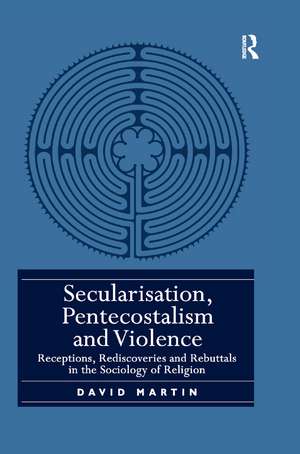Secularisation, Pentecostalism and Violence: Receptions, Rediscoveries and Rebuttals in the Sociology of Religion
Autor David Martinen Limba Engleză Paperback – 12 dec 2019
As such, this collection is vital reading for all academics with an interest in David Martin’s work, as well as those involved with the sociology of religion and the study of secularisation more generally.
| Toate formatele și edițiile | Preț | Express |
|---|---|---|
| Paperback (1) | 389.38 lei 6-8 săpt. | |
| Taylor & Francis – 12 dec 2019 | 389.38 lei 6-8 săpt. | |
| Hardback (1) | 1108.37 lei 6-8 săpt. | |
| Taylor & Francis – 9 mar 2017 | 1108.37 lei 6-8 săpt. |
Preț: 389.38 lei
Nou
Puncte Express: 584
Preț estimativ în valută:
74.51€ • 77.32$ • 62.28£
74.51€ • 77.32$ • 62.28£
Carte tipărită la comandă
Livrare economică 17-31 martie
Preluare comenzi: 021 569.72.76
Specificații
ISBN-13: 9780367886752
ISBN-10: 0367886758
Pagini: 208
Dimensiuni: 156 x 234 x 11 mm
Greutate: 0.45 kg
Ediția:1
Editura: Taylor & Francis
Colecția Routledge
Locul publicării:Oxford, United Kingdom
ISBN-10: 0367886758
Pagini: 208
Dimensiuni: 156 x 234 x 11 mm
Greutate: 0.45 kg
Ediția:1
Editura: Taylor & Francis
Colecția Routledge
Locul publicării:Oxford, United Kingdom
Public țintă
Postgraduate and UndergraduateCuprins
Part I The travels and travails of the concept of secularisation
1 Overview of the problem
2 Exploring my own reception
3 Extensions of the secularisation debate
4 Secularisation and other disciplines
5 Recapitulation in the sociology of religion in Britain
6 Changing patterns and changing receptions in painting and music
Part II Ancillary debates: violence, Pentecostalism
7 Religion and violence
8 Reception and Pentecostalism
Part III Examples
9 Religion and the varied sources of violence: disrupting a narrative
10 Religion and the variable patterns of cultural change – modernisation?
1 Overview of the problem
2 Exploring my own reception
3 Extensions of the secularisation debate
4 Secularisation and other disciplines
5 Recapitulation in the sociology of religion in Britain
6 Changing patterns and changing receptions in painting and music
Part II Ancillary debates: violence, Pentecostalism
7 Religion and violence
8 Reception and Pentecostalism
Part III Examples
9 Religion and the varied sources of violence: disrupting a narrative
10 Religion and the variable patterns of cultural change – modernisation?
Recenzii
"Astonishing in its range of intellectual, historical, and cultural references, this book illuminates the work of a scholar who has been a leader in his field for half a century and still writes with both energy and urgency. David Martin reflects on many of his characteristic concerns – secularisation, pacifism and violence, Pentecostalism, religion and the arts – and in the process constructs an image of sociology as a vital and morally serious calling."
- Simon Coleman, Chancellor Jackman Professor, University of Toronto, Canada
"Along the way in its 194 pages, Martin provides incisive analysis on key trends in contemporary religion that even those who have not kept up with his prolific work can appreciate."
- ReligionWatch Vol. 32, No. 9 July 2017
"For the aspiring sociologist of religion, this book is essential reading. Indeed, many young academics across the humanities would clearly benefit from the long view encapsulated here."
- The Revd Duncan Dormor, Chief Executive of USPG
‘Astonishing in its range of intellectual, historical, and cultural references, this book illuminates the work of a scholar who has been a leader in his field for half a century and still writes with both energy and urgency. David Martin reflects on many of his characteristic concerns—secularisation, pacifism and violence, Pentecostalism, religion and the arts—and in the process constructs an image of sociology as a vital and morally serious calling.’
Simon Coleman, Chancellor Jackman Professor, University of Toronto, Canada
- Simon Coleman, Chancellor Jackman Professor, University of Toronto, Canada
"Along the way in its 194 pages, Martin provides incisive analysis on key trends in contemporary religion that even those who have not kept up with his prolific work can appreciate."
- ReligionWatch Vol. 32, No. 9 July 2017
"For the aspiring sociologist of religion, this book is essential reading. Indeed, many young academics across the humanities would clearly benefit from the long view encapsulated here."
- The Revd Duncan Dormor, Chief Executive of USPG
‘Astonishing in its range of intellectual, historical, and cultural references, this book illuminates the work of a scholar who has been a leader in his field for half a century and still writes with both energy and urgency. David Martin reflects on many of his characteristic concerns—secularisation, pacifism and violence, Pentecostalism, religion and the arts—and in the process constructs an image of sociology as a vital and morally serious calling.’
Simon Coleman, Chancellor Jackman Professor, University of Toronto, Canada
Descriere
In this book David Martin brings together a coherent summary of his many years of ground-breaking academic work on the sociology of religion. Covering key and contentious areas from the last half century such as secularisation, religion and violence and the global rise of Pentecostalism, it presents a critical recuperation of these themes, some
